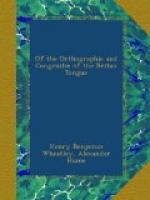Quherfoer, quherforr = wherefore, pp. 7, 8, 10, 15.
Quherin = wherein, pp. 20, 22.
Quherof = whereof, pp. 29, 34.
Quheron = whereon, p. 22.
Quherupon = whereupon, pp. 8, 27.
Quherwith = wherewith, p. 2.
Quhil, quhiles = while, p. 2.
Quhilk = which.
Quhither = whether, pp. 11, 17, 18, 20, 32.
Quho = who, pp. 12, 14, 15, 18, 22.
Quhom = whom.
Quhy = why, pp. 20, 21, 29.
Quhyte = white, p. 30;
quhiter, p. 30;
quhytest, p. 30.
Quod = quoth, p. 18.
Rease = rose, p. 18.
Red = read, p. 34.
Regne = reign, p. 20.
Retine = retain, p. 20.
Ryseth = ariseth, p. 9.
Sa = so, p. 21;
sae = so, p. 17.
Sal = shall, pp. 9, 11, 23, 34.
Sall = shall, pp. 8, 22.
Shaued = showed, p. 7.
Shour = shower, p. 10.
Sib = related, p. 21.
Sik = such, pp. 1, 2, 8, 9, 11, 17, 29.
Sillie = wretched, poor, p. 2.
Skuiographie,
probably an invented word,
the intention of the author being to
oppose skew or askew to +orthos+,
straight. It has been suggested
that it may be intended for
sciagraphy, +skiagraphia+, also spelt
sciography; but this is improbable,
as the meaning of that word,
viz., the art of shadows,
including dialling, is so inappropriate
in this passage, p. 2.
Sould = should, pp. 7, 8, 11, 12, 13, 17, 18, 19,
22, 28, 29.
Spering = inquiring, p. 18.
Spil = destroy, spoil(?), p. 13;
spill, p. 22.
Spilt = corrupted, spoilt(?), p. 2.
Stack = stuck, p. 2.
Stean = stone, p. 8.
Stiddie = anvil, pp. 12, 17.
“And my imaginations
are as foul
As Vulcan’s stithy.”
Hamlet,
Act iii., sc. 2.
Strang = strong, p. 14.
Sum = some, pp. 8, 9, 10, 21, 34.
Supposit = subject, pp. 30, 31.
Syllab = syllable, pp. 14, 15, 16, 18, 21, 22;
syllabes, p. 8.
Ben Jonson spells this word
syllabe in his English Grammar.
Syne = since, p. 1.
Tal = tale, p. 9.
Tal = tail, p. 9.
Tale = tall, p. 28.
Trow = believe, pp. 13, 18.
Tuae = two, pp. 1, 8, 9, 10, 22, 23.
Tuelfe = twelve, p. 3.
Tuich = touch, pp. 7, 13, 15, 17;
tuiches, p. 11.
Tuiched = touched, pp. 3, 17.
Tuich stone = touchstone, p. 19.
Tyme passing befoer = imperfect tense, pp. 31, 32.
Tyme past befoer = pluperfect tense, pp. 31, 32.
Tyme past els = perfect tense, pp. 31, 32.
Vadimonie = recognisance, p. 22. Lat. Vadimonium.
Voce = voice, p. 20.
Waet = know, p. 14.
Wait = know, p. 11.
Wald = would, pp. 1, 2, 9, 10, 13, 14, 16, 20, 21,
30, 31.
Warkes = works, p. 29.
Weer = war, p. 3.
Were = war, p. 20.
Whither = whether, p. 2.
The author in this place uses
the letter w instead of qu,
although at p. 18 he is so
strenuous against its use.
Wrang = wrong, pp. 2, 9, 11.




